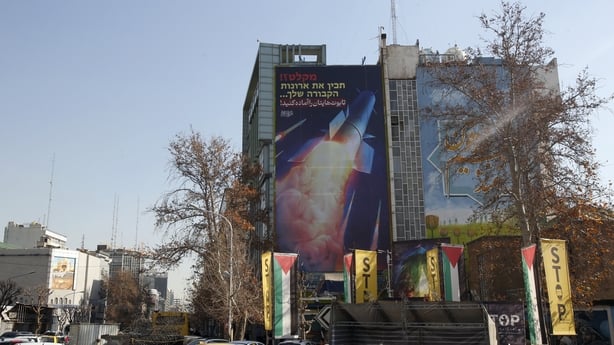Tehran's top diplomat has said that his country's armed forces targeted an "Iranian terrorist group" in Pakistan yesterday, after Islamabad said the strike killed two children.
"None of the nationals of the friendly and brotherly country of Pakistan were targeted by Iranian missiles and drones," Foreign Minister Hossein Amir-Abdollahian said on the sidelines of the World Economic Forum in Davos, Switzerland.
"The so-called Jaish al-Adl group, which is an Iranian terrorist group, was targeted," he added.
The raid came late yesterday after Tehran also launched attacks in Iraq and Syria against what it called "anti-Iranian terrorist groups".
Pakistan denounced the strike near the nations' shared border, recalled its ambassador from Iran and blocked Tehran's envoy from returning to Islamabad.
A few hours before the strike, Pakistani caretaker Prime Minister Anwar-ul-Haq Kakar met Mr Amir-Abdollahian on the sidelines of the Davos Forum.
Mr Amir-Abdollahian said Iran's attack on "Pakistan's soil" was a response to the Jaish al-Adl group's recent deadly attacks on the Islamic republic, particularly on the city of Rask in the southeastern province of Sistan-Baluchistan.
At attack on 10 January on a police station in the city killed a policeman, almost a month after 11 police officers were killed in a similar attack in the area.
Both attacks were claimed by Jaish al-Adl (Army of Justice), a Sunni Muslim extremist group that was formed in 2012 and is blacklisted by Iran as a "terrorist" group.
"The group has taken shelter in some parts of Pakistan's Balochistan province," Mr Amir-Abdollahian said, adding that "we've talked with Pakistani officials several times on this matter".
The foreign minister said Iran respected the sovereignty and territorial integrity of Pakistan but would not "allow the country's national security to be compromised or played with".

The Iranian strikes add to multiple crises across the Middle East, with Israel waging a war against Hamas in Gaza and pro-Palestinian Huthi rebels in Yemen commercial attacking vessels in the Red Sea.
Pakistan's official statement did not say where the strike took place.
But Pakistani social media accounts said blasts occurred in Balochistan province, where the two countries share a sparsely populated border of nearly 1,000 kilometres.
"This violation of Pakistan's sovereignty is completely unacceptable and can have serious consequences," Pakistan's foreign ministry said in a statement.
'Illegal act'
Tehran and Islamabad frequently accuse each other of allowing militants to operate from the other's territory to launch attacks, but it is rare that official forces on either side engage.
"It is even more concerning that this illegal act has taken place despite the existence of several channels of communication between Pakistan and Iran," Pakistan's foreign ministry said.
"Pakistan has always said terrorism is a common threat to all countries in the region that requires coordinated action.
"Such unilateral acts are not in conformity with good neighbourly relations and can seriously undermine bilateral trust and confidence."
Iraq recalled its ambassador from Iran yesterday, condemning as a "clear act of aggression" deadly missile strikes by its ally on its autonomous Kurdish region.
Four people were killed and six others wounded in the attack in Iraq, according to the Kurdistan security council.
Iraq challenged Iran's claim that the strikes targeted Israel's intelligence services in response to recent Israeli assassinations of Iranian and pro-Iranian commanders.
It said it would lodge a complaint with the UN Security Council over the Iranian "attack on its sovereignty".
Iran defended its missile strikes in Iraq and Syria, saying they were a "targeted operation" and "just punishment" against those who breach the Islamic republic's security.
"The Islamic republic, with its high intelligence capability, in a precise and targeted operation identified the criminals' headquarters and hit it with precision weapons," foreign ministry spokesman Nasser Kanani said.
Iran's Revolutionary Guards said they had destroyed the "Zionist regime's spy headquarters in the Kurdistan region of Iraq".
Iran has made support for the Palestinian cause a centrepiece of its foreign policy since the 1979 Islamic revolution.
The Islamic republic supports Palestinian militant group Hamas and hailed its deadly 7 October attacks on Israel as a "success" while denying any direct involvement.
Regional tensions have spiked since, drawing in Iran-backed armed groups in Lebanon, Iraq, Syria and Yemen.

